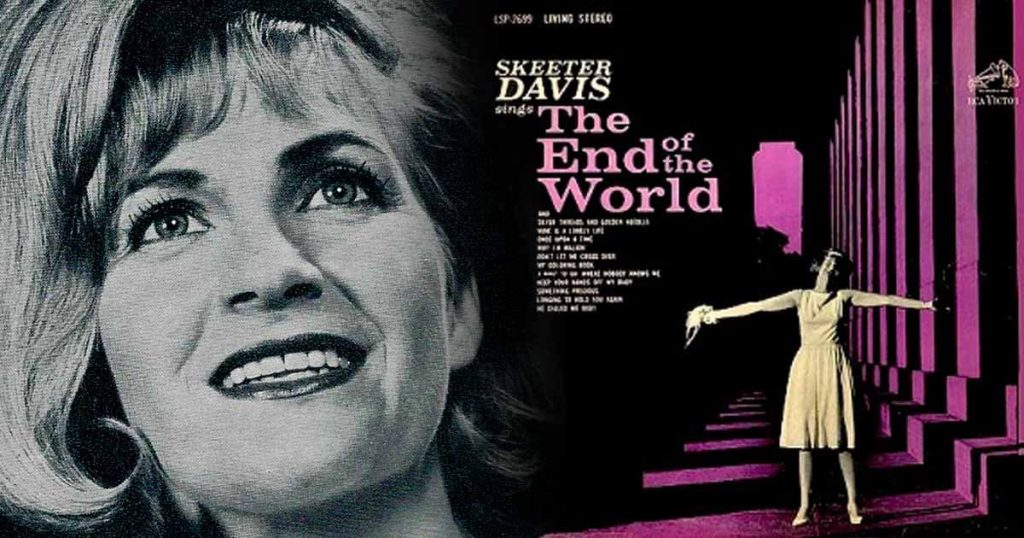
“The End of the World” – Skeeter Davis’ Timeless Ballad of Heartbreak and Loss
Skeeter Davis’ haunting 1962 ballad “The End of the World” is a rare song that transcends genres, generations, and emotions. Released at the height of her career, the song reached impressive chart positions, peaking at No. 2 on the Billboard Hot 100 and No. 2 on the Hot Country Singles chart. Its crossover success also saw it reach No. 1 on the Billboard Easy Listening chart, making it one of the few songs at the time to perform equally well across pop, country, and adult contemporary formats.
What makes “The End of the World” so enduring is its ability to capture the overwhelming, universal sensation of heartbreak in its purest form. Written by Arthur Kent and Sylvia Dee, the song expresses the quiet devastation of losing a loved one, blending simplicity with emotional depth. It’s a song where every word feels deliberate, and every note carries weight. Dee, who penned the lyrics, was reportedly inspired by the grief she experienced following the death of her father, giving the song an extra layer of authenticity and personal sorrow.
The song opens with a vulnerable question:
“Why does the sun go on shining? / Why does the sea rush to shore?”
This juxtaposition between the indifferent natural world and the narrator’s inner turmoil sets the tone for the entire piece. In Davis’ soft, trembling voice, the lyrics convey the confusion of someone trying to understand how life can continue as usual when their own world has collapsed. As the song progresses, it becomes clear that this is not just a story about sadness; it’s about the incomprehensible nature of loss, a theme that resonates universally.
Musically, “The End of the World” is a masterclass in restrained emotion. The arrangement is delicate, featuring a gentle acoustic guitar, soft percussion, and wistful string flourishes. The sparse instrumentation allows Davis’ vocal performance to take center stage, heightening the sense of intimacy and vulnerability. Her voice, sweet yet tinged with sadness, perfectly conveys the fragility of someone grappling with emotional devastation. It’s this vocal delivery that makes the song feel like a private confession, as if Davis is sharing a deeply personal sorrow directly with the listener.
One of the most striking aspects of “The End of the World” is how it blurs the lines between country and pop. While Davis was primarily known as a country artist, this song’s lush production and universal themes made it accessible to pop audiences, too. Its success across multiple charts is a testament to its broad appeal. At a time when genres were more rigidly defined, “The End of the World” broke down those barriers, showing that a great song could resonate with anyone, regardless of their musical tastes.
The song’s melancholy message found renewed relevance during the turbulent 1960s, a decade marked by social upheaval and personal uncertainty. Many listeners connected with its themes of despair and longing, making it a staple on radio stations across the country. Even today, the song continues to captivate audiences with its timeless portrayal of loss. It has been covered by numerous artists over the years, including Brenda Lee, Susan Boyle, and Nancy Sinatra, but Davis’ original recording remains the definitive version, unmatched in its emotional impact.
“The End of the World” has also cemented its place in popular culture, appearing in films, TV shows, and commercials, most notably in movies like Girl, Interrupted and Mad Men. Its gentle, wistful melody has a way of evoking nostalgia, transporting listeners to moments of quiet reflection on their own experiences of love and loss.
Though decades have passed since its release, Skeeter Davis’ voice in “The End of the World” still speaks to listeners as profoundly as ever. Its simple yet profound lyrics, paired with a tender, heartfelt melody, ensure that the song remains a classic for anyone who has ever experienced the pain of a broken heart. Whether heard for the first time or rediscovered years later, “The End of the World” continues to resonate as a beautiful, bittersweet reminder that life—and love—can change in an instant, leaving us to pick up the pieces in a world that somehow carries on.